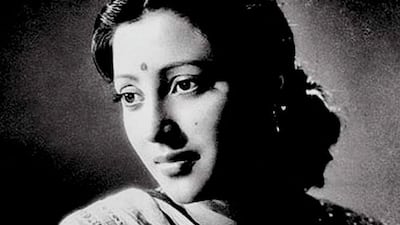Suchitra Sen: The Legend and the Enigma
Shoma A Chatterji
Harper Collins India
Dh62
Her forte was Bengali films, usually opposite Uttam Kumar, and she only appeared in a handful of Hindi films out of the 60-odd she made before retiring into seclusion, à la Greta Garbo, but Suchitra Sen is still fondly remembered.
First there is her classical beauty, expressive features and dignified – not to mention understated – portrayals of a range of morally complex roles. She also began acting after marriage and motherhood – a rare feat in an industry that champions youth over experience.
She is also the only star to turn down an offer from Satyajit Ray, and decline the Dadasaheb Phalke Award – Indian film’s most prestigious honour – if it meant making a public appearance after she had retired from the spotlight, thus maintaining her enduring mystique.
Well-known are her carefully calibrated, but no less powerfully-emoted, performances in 1953's Sharey Chuattor (the first of 30 films opposite Kumar), Sadanander Mela (1954), Harano Sur (1957), Saptapadi (1961) and Saat Pake Badha (1963), as well as Uttar Falguni (1963) and its Hindi remake Mamta (1966).
There is less awareness, however, of the contours of her journey from Roma Dasgupta to Suchitra Sen.
There is much written on Sen in Bengali, but not much in English save for a small (in all senses of the word) introductory biography.
The studies that exist focus on her long, successful cinematic partnership with Kumar.
Filling this gap is award-winning film critic and journalist Shoma A Chatterji, who earlier wrote that small profile.
Expanding on it was not an easy task for the writer, who asks herself whether it is “possible to write the life story of a person the writer has never met in flesh-and-blood, and spoken to over the telephone only twice?”. In addition, she wonders: “How honest is it to indulge in this second-hand biography?”
But for Chatterji, who has the acclaimed Paroma and Other Outsiders: The Cinema of Aparna Sen to her credit, her "passion for cinema in general, and the star-persona of a legendary actress in particular" triumphed and convinced her to attempt "to present and portray Sen from the standpoint of an avid viewer of films, a film critic and an author".
The end product is a fairly comprehensive work aimed at Indian (non-Bengali speaking and understanding) film aficionados, who have long admired Sen's performance in Mamta or as Aarti Devi in Aandhi (1975), and want to know more about this graceful and capable actress.
They will not be disappointed, as they learn of her no less-polished Bengali acting showcases, as Archana in Saat Pake Bandha, Rina Brown in Saptapadi, psychiatrist Dr Roma Banerjee in Harano Sur and dedicated nurse Radha Mitra of Deep Jwele Jaai (1959), among others.
Chatterji starts with an overview of the actress’s early life and the unique circumstances in which she began her cinematic journey – with the blessings of an enlightened and encouraging father-in-law, who hailed from one of the top families in Bengal.
Then her long-lasting and successful on-screen chemistry with Kumar is documented, and her metamorphosis from “star to actress” that took in non- Kumar films (as well as insightful comparisons with other contemporary heroines – Nargis, Madhubala, Meena Kumari, as well as Kanan Devi and Sabitri Chatterjee), an examination of her place in portraying working women and advancing feminism in Bengali cinema as a whole, before her decision to spend more than three decades living a secluded life, and the possible reasons.
Though it feels slightly academic in places, the book will appeal to not only Sen’s fans but also students of cinema history, as well as those who are interested in acting methods and how her roles related to what was happening in Indian society at the time the films were made.
Film buffs will also learn some interesting trivia – including which of her films inspired Shah Rukh Khan's 1993 movie Baazigar.
* IANS
artslife@thenational.ae

